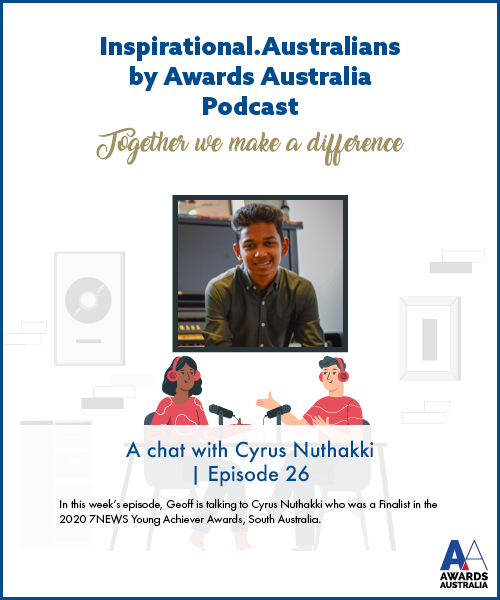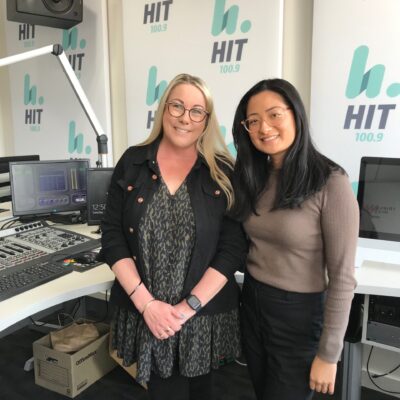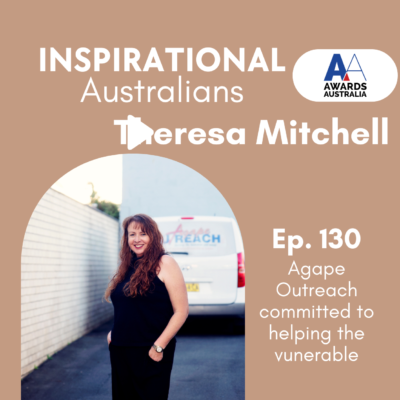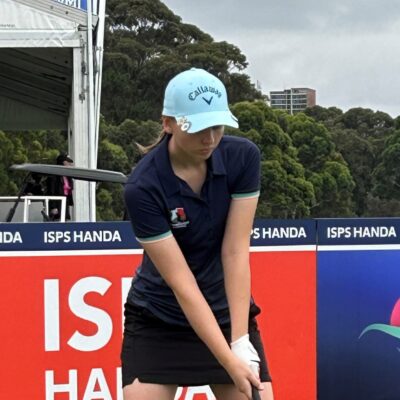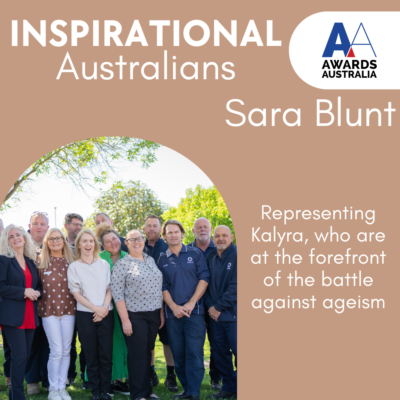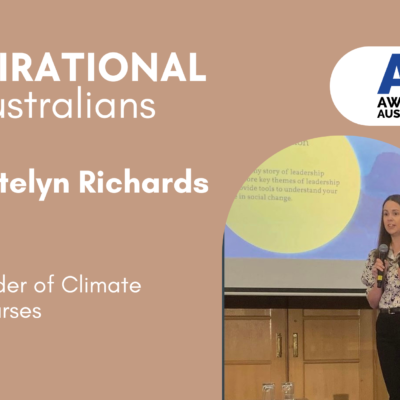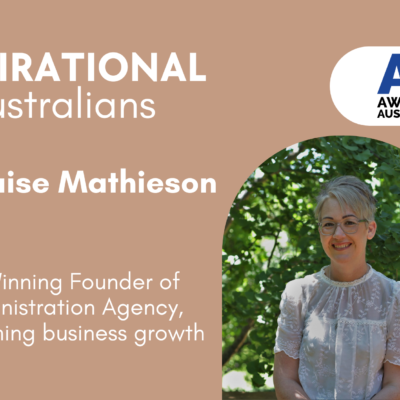In this week’s episode, Geoff is talking to Cyrus Nuthakki who was a Finalist in the 2020 7NEWS Young Achiever Awards, South Australia.
Cyrus is a young pianist and an aspiring composer who wants to work in Hollywood and produce tracks for artists.
He was a Finalist in the 2020 7NEWS Young Achiever Awards in the Carclew Creative Achievement Category. He also won a Carclew Fellowship in 2020 to assist with his professional development and to further his music career. Cyrus completed his SACE Stage 2 Music whilst in Year 8 and was announced as the ‘youngest South Australian to have completed a SACE subject in 2018 ‘.
In this episode:
- Hear how dedicated Cyrus is to his craft and the hours he spends to improve and hone his musical talent and skill set
- From Hip Hop to Classical, Cyrus has it covered and his passion to get into the Hollywood scene is very strong.
Links
If you want to connect with Cyrus, please email him at: cyrus.nuthakki@gmail.com
Follow us on our Inspirational.Australians Instagram Page
Want to nominate someone? (It can take as little as 2 minutes to recognise someone making a difference)
Like some more information on Corporate Partnership?
Transcript
Anette (00:05):
Welcome to the Inspirational Australians podcast, where we chat to people, making a difference in their communities and in the lives of others. And here is your host for today, Geoff Griffin.
Geoff (00:21):
Welcome to the inspirational Australians podcast, stories of inspiring achievements and community contribution. Every week we will celebrate an award program category winner or finalist. We hope you’ll be inspired and encouraged to know that Australia is in good hands together with our corporate partners and not for profit partners, Awards Australia showcase ordinary people from right across Australia, doing extraordinary things. If you enjoy hearing the stories about inspirational Australians, please subscribe, rate, and review us, we’d really appreciate it. From everyone from Awards Australia and the Inspirational.Australians podcast, we hope you had a wonderful Christmas and were able to share the joy of giving and appreciating the special and important things in life. Through our podcast, we hope to lift your spirits, make you smile and appreciate the amazing people that share our country and feel hopeful that our future is in good hands. As we look to for 2021 for a better year, than the one that has given us so much pain for so many, I hope you’re going to enjoy listening to our podcast today with a guest who was a 2020 finalist in the Carclew Creative Change Award as part of the 7News Young Achiever Awards for South Australia. Cyrus Nuthakki at only 16 years of age is an extremely talented pianist and also a burgeoning young composer Cyrus. Welcome to the podcast, mate.
Cyrus (02:03):
Thank you for having me, Geoff.
Geoff (02:06):
Uh, absolute pleasure. What a, what a style. I have not a musical bone in my body, so I’m certainly always caught thrilled and in awe of anybody like yourself. So congratulations on all that you’ve done and I believe Cyrus that you completed year 12 and SACE stage two music at just 13 years of age. Was that a misprint or is that correct?
Cyrus (02:35):
That’s correct.
Geoff (02:38):
That’s, that’s pretty amazing. You’re the youngest South Australian to study a SACE subject in 2018. Yeah, that’s pretty amazing. Tell us more about how difficult and intense that might’ve been for a 13 year old.
Cyrus (02:53):
If we’re talking about the exam itself, it was purely because the time you’re running, it’s running out and especially at a young age where you don’t have much experience with exams, especially SACE exams can be pretty pressuring.
Geoff (03:10):
The, was it a whole year that you had to study or was it part of the…
Cyrus (03:16):
I can’t remember very well. I think it was a semester subject. My teachers were very helpful and to help a student who’s four years younger than the level of their study. And I think my teachers were the biggest help at Brighton secondary school where I studied.
Geoff (03:33):
Bit of a plug there for Brighton secondary. Um, so did you feel intimidated being so much younger than everybody else?
Cyrus (03:42):
Not at all, I fit in, well, it’s a small class, so I think it was only five people.
Geoff (03:47):
Yeah. Sometimes that can be even more intimidating. You must have had confidence in yourself not to feel intimidated.
Cyrus (03:54):
It just felt like a normal classroom to me. Um, it’s sort of become like a family at the end of the year, because you shared ideas of music and just, you know, gossip and sort of become like my older siblings, to be honest.
Geoff (04:12):
Yeah. Well, it’s pretty cool. Obviously. You’re pretty confident in yourself and your ability to fit in. And I think that’s a really important lesson for everybody to understand that we all need to believe in ourselves and not worrying about what others might think, but really forge ahead knowing that being the best version of yourself is good enough. So I think there’s a, there’s a hidden lesson and that aligns. So that’s awesome that you didn’t feel intimidated. You just felt like you fit it in with your older siblings as said, which is pretty awesome. Cyrus, you did grade eight in piano through AMEB and Trinity College of London. And you’ve got to high a distinction for that, which is pretty impressive. What was involved. I mean, what level of involvement was there in and how did you get to become part of that?
Cyrus (05:08):
Oh, to become a part of it, you pay for it. I jumped grades, the first grade I did was great two and then graded five, six, and then I jumped straight to eight. Um, in India when I did the exams, just felt like a normal performance to me. I was performing to an audience and the examiners they’re never too serious. They always, you know, neutral. And it doesn’t pressure you.
Geoff (05:39):
Well, that’s pretty cool because you know, you falsely see in the movies, everybody’s, you know, staring down at you.
Cyrus:
Cyrus (05:47):
It’s never like that.
Geoff (05:08):
Well, that’s good to know if anybody’s, I’m keen to learn the piano and move through the grades, never fear. It’s not easy.
Cyrus (05:58):
Music is an experience. It’s not really a test or you should never take exams as an it’s just a certificate, but it doesn’t determine what kind of an artist you are.
Geoff (06:09):
Well, I mean, there’s something in that for everybody because that’s so true. Yeah. Um,
Cyrus (06:16):
Well it could be sports, music could be anything that philosophy applies to it.
Geoff (06:20):
Yeah. You’re not defined by one result or your particular grade at a certain moment in your life. You’re defined by who you are, what you, and what you do over a period of time. And I love your attitude about, you know, music is all encompassing. It’s, it’s there to be cherished and loved by everybody. And it’s not a chore. It’s not an one exam. It’s, it’s about a feeling that feeling that you have as a person.
Cyrus (06:45):
And in some grades, I’ve got lower marks than other grades. And it never put me down to be honest, because one in grade six, when I did it, I was extremely sick. And throughout the, I couldn’t do much practice, but I knew, and I was happy with the result. It is what it is, what it is. And I put extra effort in grade eight and I got a high distinction.
Geoff (07:09):
Yeah. It’s brilliant. How many people were involved in the AMEB, program and Trinity College of London, you know, examining process, how many people were involved, uh, in the, in the period that you were involved?
Cyrus (07:28):
Not really sure, but there’s only one examiner, but then they take the result and everything back to, um, the Trinity College of London and they send you a certificate and the mark sheet back.
Geoff (07:43):
And many there must have been, you’re obviously at the top of the pile to get a high mark.
Cyrus (07:50):
Yeah. Well, to be honest, AMEB was a hardest syllabus too. Um, for me wasn’t difficult or challenging, but I found AMEB to be more advanced in its syllabus and the pieces that I had to play. Yeah, yeah, yeah. So I was happy to do the Australian one because yeah, it’s a high degree and I like to be challenged.
Geoff (08:18):
I learnt, um, three blind mice. How does that rank, you know, sort of, well, I’ve got through that examination, do you think?
Cyrus (08:26):
Yeah, of course I would have given you a 100.
Geoff (08:31):
Good answer and I believe you won second prize at the 2019 Ryman Robinson Scholarship Fund Raising. What was that about? What was involved with that?
Cyrus (08:45):
It’s just an award and to be honest, um, I just go to these things. Um, I always sign up for under 24’s or whatever, I’d like to compete with adults and try to come out on top because as I told before, I’d like to be challenged. And that’s why I didn’t do music in year 12 this year as well, because I didn’t find it challenging enough for me. So with the help of my piano teacher, Rodney Smith, I got entry into the elder Conservatorium through the Open Music Academy where I’m challenged and I’m learning a lot and I can see huge progress, my piano and music skills.
Geoff (09:29):
Elder Conservatorium at 16, pretty, pretty special. And I do remind our listeners that you are, you have just turned 16, a pretty impressive young man that all of us could learn from, to be honest, I’m a little older than 16, and I can learn a lot from just a few years older. Uh, I can learn a lot from, from you. You are amazing. Now you performed a masterclass facilitated by Australian composer, Steven Whittington. You participate in number of competitions. I know it’s tell us some of your experiences and where you’ve performed and what are some of the highlights
Cyrus (10:13):
Oh. Playing at the master class with Steven Willington. That was really helpful because now I’ve sort of contacted him to become my composing teacher as well. So that was a great opportunity. And just going to these things, you get to know people and you learn and you get experienced. So you’re not nervous the next time, I never get stage fright nowadays, because it’s just become a habit now. And I think that’s what it’s about because music is an art, but you can also practice things like these to overcome your fears.
Geoff (10:45):
Yeah. Why are you, so I’m old now too, you know, and did not need to be nervous, but I think you hit the nail on the head before, when you said that, um, you know, it’s not about a score or whether you’re perfect one day or the other, it’s about loving what you do and wanting to be better and better, and seeing it as a joy and music as a joy for others too. So I think that’s just a wonderful attitude to have. It’s probably, as I said, I keep saying, well, there’s all, there’s all, there’s so much to learn from you for all of us in so many ways. And you talked about, or various things like sport. And so on the same applies, I know you’re a really keen and passionate young composer, and that is gaining a lot of interest in your mind. Uh, tell us more about your composing experiences to date. What led you to, was it, you know, Steven Whittington, that led you to think about composting or how, how did that all come up, come about?
Cyrus (11:51):
Or I’ve been sort of composing since I was three years old because, I’m from a musical family and my dad back in India, he was working with, um, different movies and composing. So we had the oldest computer set up. So I just got interested in making music, whether classical or pop or hip hop, anything and sound engineering. So that’s a big part that I want to learn about. Yeah.
Geoff (12:22):
Uh, pretty fascinating. So who’s better, you or dad?
Cyrus (12:26):
Of course dad, more experienced, but I’ll catch up to them.
Goeff (12:31):
Good work. I had decided that in Casey, he’s the podcast, you have to say, he’s very smart. Well, your dad must be a pretty impressive man, as well as your mum musical?
Cyrus (12:44):
Yeah. She used to be a singer.
Geoff (12:46):
Oh, really? In India a singer?
Cyrus (12:51):
Just concerts and stuff.
Geoff (12:54):
Yeah. What type of music, you know, w what type of music did she sing? Uh, like what genre?
Cyrus (13:01):
When India, you can listen to whatever she likes English, but, um, she used to sing Indian music.
Geoff (13:07):
Yeah, yeah, yeah, yeah. Not, not rock music.
Cyrus:
No.
Geoff: (13:18):
Uh, well, that’s pretty cool. Um, I believe you would love to get into the Open Music Academy. What is that? And what would that achieve for you?
Cyrus (13:29):
I’m already in it, that’s the other Conservatorium program.
Geoff (13:31):
Ah, okay. So that is, that’s the mentoring program?
Cyrus (13:38):
Yeah. So I was mentored by Lucinda Colins. Uh, and she has helped me so much. I can see so much difference in my playing from last year. Yeah. And I just can’t wait to, well, COVID put a bit of a dent in my performing career. And so I couldn’t show it. People couldn’t see the difference, but I can’t wait to go into 2021 and perform more and people can see how much I’ve improved.
Geoff (14:07):
Yeah. Well, that, that would be amazing. It has been a tough year. Hasn’t it for everybody? And the people like yourself performers, no different. Haven’t had the opportunity to get in front of people and it’s been a shocker of the year, but hopefully we’re coming up the other side and things will improve in one day. You want to hit the Hollywood?
Cyrus:
Yeah.
Geoff:
Like your dad’s footsteps, but in Hollywood and getting to the, uh, film score, composing,
Cyrus:
not Bollywood the other way.
Geoff:
So is there more money, more money in Bollywood or Hollywood?
Cyrus (14:46):
Pretty much the same because in Bollywood it’s a pretty big industry.
Geoff (14:49):
It might be once you’ve made in Hollywood and then everything switched to Bollywood, you know? So what’s the plan from here then? How what’s the process and the plan to get to Hollywood?
Cyrus (15:06):
Well, that’s a long road and I’m thinking about completing PhD, master in music. That’s the sort of things I want to do in uni and looking to go overseas for that. Um, but to be honest, I think I’ll do my bachelor degree in Adelaide.
Geoff (15:27):
Yep. Yep. Yeah.
Cyrus (15:30):
It’s a prerequisite for a masters of music. So I think I’ll just stay here for a few more years with family and friends and complete that and move overseas. Yeah.
Geoff (15:40):
Yeah. Well, you’re still a young side, not bad idea. So Cyrus, you’re looking to potentially go to University of Adelaide to study, which is pretty cool, cause they’re a sponsor of the awards. I don’t know if you knew that. They’d been with us for a very long time and I to educate, train and make champions of tens of thousands of young people. What style of composing do you like? I don’t know what I’m talking about here, but…
Cyrus (16:13):
And that is the best question you’ve asked me because that’s what I can talk about the most. Um, so when I started out, what I did was hip hop bears. Yeah. that’s what I still do because me and my friend, we work together and we make beats. And I don’t know if you would’ve known, but OFB, they’re a music group in the UK and they’re pretty famous now, but we’ve got a contact and we’ve sent some beats over or it’s up to them if they want to look at it. But it’s just things like these, uh, context is the most important thing in the music industry. Yeah. Yeah. So that’s how I sent just a little beat pack to them. And if they want to look at the beats, that’s up to the management, but that’s how it works. You get noticed sometimes you don’t get noticed sometimes.
Geoff (17:09):
Yeah. So will you do that with other bands?
Cyrus (17:14):
Yeah. They’re hip hop groups. So, um, other people, other hip hop artists could also use them. I can just keep sending it around. That’s how it works and that sort of experience, cause I mixed my own beats, that’s sound engineering.
Geoff (17:31):
All right, cool. You got anything you can play for us now?
Cyrus (17:35):
Not right now.
Geoff (17:37):
I put you on the spot there. You don’t want to give away any secrets. Anyway,
Cyrus (17:41):
No, but you’ll hear my music soon. Soon enough.
Geoff (17:43):
We look forward to it, we’ll be able to say we heard Cyrus first on the inspirational Australians podcast. Um, so you like hip hop and stuff like that.
Cyrus (17:57):
Yes, but I can compose for any genre. I can do anything.
Geoff (17:59):
So you can do anything yeah, so you like anything as well.
Cyrus:
Of course.
Geoff:
But it’s your favorite.
Cyrus (18:06):
Yeah. And um, cinematic music. That’s what you need for Hollywood, to be honest. Yeah. Yeah.
Geoff (18:13):
So it’s a different type of composing, isn’t it really?
Cyrus (18:16):
Yes, that’s why you need the classical music knowledge to be able to come for compose for situations in the movies.
Geoff (18:24):
Yeah. Yeah, exactly. That important tense music, uh, intense, scary music, you know, that’s,
Cyrus (18:34):
There’s different, different chord, progressions and harmonies, they create this feeling that without even you, it sounds silly when you think about it that a bunch of chords played in an order can make you feel something, but it does that’s music and that’s how humans are. And that’s how the, yeah. So knowing these things like harmonies and studying, this will help me later on in my composing career. Hopefully I can make it there.
Geoff (19:00):
Yeah. Well, it will be awesome. Um, maybe you can give us a, um, an autograph one day.
Cyrus:
It’s a competitive field
Geoff:
Being tongue in cheek, but I do appreciate how intense getting to that opportunity would be. So your first you have to complete your studies, maybe a PhD overseas, you have a, would you go to the States or England?
Cyrus (19:23):
Yeah. States or England, that’s my choice.
Geoff (19:26):
Uh, hopefully from there some connections, get you, do you think your dad will have any context, uh, that or user’s name and that was in Bollywood? Uh, surely I can get the poly, but um, but your dad must be pretty impressive to have done what he has done to
Cyrus (19:50):
Yeah. Oh, I learned from him the basics and then we’re in a different generation now. So the music, genres and styles are different. So I went my own way and different country now as well. So it’s different language, culture, everything. So, and I am here now, so I just sort of adapted. Yeah.
Geoff (20:10):
Tell us, is there anything else about, uh, composing that you wanted to add? You know, how is it, is it it’s just a natural thing? Is it something that you have to learn or is it a combination of both
Cyrus (20:23):
Composing it’s sort of experience from, so if you ask me to play something, I can keep improvising all day because I’ve played for years and I can just make up music, um, as I could, and I can go to different scales and key signatures and um, yeah, so that’s just sort of experience and experiences the main thing. So I think I’ve played the piano enough and composed like tracks for hip hop orchestra, music enough for me to keep going.
Geoff (20:57):
How many, uh, how many hours a week do you spend practicing? You know, and all that.
Cyrus (21:03):
Saying, uh, creating music on computer. Just, I make beats in like five minutes. Yeah. So I make a couple a day and then I take a break and helped back on after a five days. It’s not really schedule. It’s just how I feel sometimes. Oh, I haven’t been on for nearly two weeks now. I haven’t felt anything, but I might hop back on soon sometime, but practicing piano, that’s different. That has to be a routine if you want to get better and especially with what I’m doing at the Conservatorium, um, it’s very important to practice for at least four hours a day.
Geoff (21:45):
Wow. Four hours a day. Yeah. That’s pretty intense. Yeah.
Cyrus (21:48):
Yeah. Well, people who are prominent pianist, they practice for eight, nine hours a day. They just take breaks to go have some lunch and then they just hop back on the piano. That’s their job. That’s why they’re.
Geoff (22:05):
Going to work on their piano.
Cyrus (22:07):
Yeah. That’s their job. So they have to practice to be the best at it.
Geoff (22:11):
That was pretty cool. I mean, I, I guess I, it makes sense. I hadn’t actually really thought about how much practice or work goes into your daily work that goes into it. So yeah. That’s, that’s fascinating. So you’ve got about another four hours a day to go Cyrus, I think you need to lift again.
Geoff (22:36):
What actually motivates and drives you to be the best you can be?
Cyrus (22:39):
There’s no reason really. It’s just, we’re a musical family. It’s just been in the family for generations. Nothing really drove me to be musical. It just came to me. I just, yeah.
Geoff:
Yeah. Just the love of it.
Cyrus:
Yeah. I don’t know. It’s just in my blood. Yeah. I play sport. I play football or soccer, football. Um, I practice a lot and train a lot, but that’s just to keep fit. I don’t see myself doing anything else. I think music is my only way. Yeah.
Geoff (23:10):
Do you wrap your fingers up in iron gloves when you go and play football,
Cyrus (23:18):
We’re not playing handball, it’s football.
Geoff (23:21):
Well, you know your fingers get in the way.
Cyrus (23:25):
I’m just joking. But yeah, it can happen sometimes it’s happened to me. So I have to be careful.
Geoff (23:31):
Yeah. We need to get them insured, get your fingers insured. Hey, changing pace for a minute, what’s something that we might not know about you?
Cyrus (23:41):
Well, I’m a sporty person, that’s something that people don’t really know, because people, when they usually see a musical person, they just think that they just sit at the piano, they’re a bit of a nerd. They just sit down and watch a read books. And yeah, that’s sort of what people think it’s a stereotype, but that’s not really the truth because I’m a musician and I want to be a professional musician composer. But then I also do other things that people don’t expect me to do. Like I played club’s sport and I’m good. And I think it’s just be yourself. You can do whatever you want. That’s the main thing.
Geoff (24:22):
I think musical people are often the most, uh, extraordinary minds in the world. Yeah.
Cyrus (24:30):
But you see them getting bullied at school and stuff by other, I don’t, I didn’t see the need for it. It’s just a stereotype that they’re a bit weird and stuff. That’s how it really is. Yeah.
Geoff (24:42):
I think they’re a little jealous that, uh, musical people, talented musicians can do things that other people can’t. And I think a lot of it comes down to pulling, comes down to jealousy and the only way they can get around that is try to be tough and people make them feel less about them.
Cyrus (25:01):
Well, being tough is not going to work after you the graduate, but being good at music, studies that’s what gets you where you need to be. So I think, um, people who struggled in school, like music students, they need to keep their head up because after they graduate, life is going to be good.
Geoff (25:20):
Yeah. Yeah. Well, bullying doesn’t work for anybody. It’s certainly no one, sir. And there’s no place for it. Cyrus, you moved from, you mentioned that you moved from India to Australia. What made the transition for your family to Australia? What precipitated that?
Cyrus (25:41):
Um, the re the things that I’m doing here.
Geoff (25:45):
So your family decided to move to Australia to give you better opportunities.
Cyrus (25:50):
Yeah, exactly. And I have a little brother as well. He’s getting into music as well. He’s nine, seven years younger, but he’s catching up to me even though he’s seven years younger
Geoff (26:04):
Cause he’s doing six hours a day and you’re only doing four.
Cyrus:
Six minutes a day, more like. We always play games.
Geoff:
Keep an eye on it. Make sure you’re always doing a little bit longer.
Cyrus (26:16):
But he’s just a little kid. He gets distracted. But as he grows up, I think he will get into more practice and yeah, I’m there to help him. And he has a good teacher as well. The same person who taught me, Rodney Smith. Okay, great teacher. And hopefully he can guide him to be better than me. I want my brother to be better than me.
Geoff (26:37):
Well, you know, that’s a great attitude and we need to set our goals high, always higher than, than you really feel you are able to achieve. Then you have a chance. If you set them low, you will achieve low. So that’s a, that’s a good philosophy for you to have for your brother as well to be, and to mentor him as you, uh, being mentored yourself. Uh, how did you find the transition coming to Australia? Um, and some of the challenges, what were they that, uh, and some of the benefits of coming to Australia as well? How did you personally find all that?
Cyrus (27:16):
Well, everything’s been a benefit to be honest, the things that I do here, India is not a bad country at all. It’s I love India, but the things that I’m doing here, I couldn’t do back in India. The teaching standard for music is not the same. Studies like academic might be difficult and it can be, it’s a great standard, but for music, the standard isn’t the same. And I think the there’s more opportunities here as well, because it’s an English speaking country. So I have more connections to places like United Kingdom, United States. Yeah. So that was the plan. I was always aiming for those two countries. Cause that’s mainly connected to like Hollywood and stuff.
Geoff (28:02):
Well, it says a lot for your parents too, obviously very, very successful in India in their careers, but um, made the transition to move to Australia to ensure that you and your brother had the opportunities or better opportunities or different opportunities than were available. Yeah. That’s pretty cool. My wife and I want to go to India one day. Um, so what’s, what’s some of the highlights. What do we need to do when we go?
Cyrus (28:30):
I’ll give you a list of things to do, when you go there.
Geoff (28:32):
Okay. We can turn that into another podcast on that travel segment. Well, the 2021 Young Achiever Awards are still open at the moment for nominations in most states and also the Northern territory. We know people like yourself, don’t look for accolades, do you do what you do because you love it and you want to entertain and, and capture people in some special, but it’s nice to receive validation for your work, would you encourage our podcast listeners to nominate someone they know that’s making a real difference and achieving something extraordinary for an award. And if so, why would you, how has it benefited you being nominated?
Cyrus (29:20):
Of course you have to be nominated for an award like this. It’s pretty honorable and I was really happy to find out that I was nominated. It was a great experience cause I’m, um, got to learn about the other finalists and I talk to them and I actually asked for an opportunity to compose for the winner of that category. Yeah, so you sort of interact with people and I gotten the contact. And so if I see him around again, I’ll be like, hello, how are you going? And do you have any other opportunities for me? And just chasing opportunities at the moment, because new in the music field, it’s all about opportunities and experience. That’s all I need for the moment.
Geoff (30:04):
Yeah, very cool. And I know whilst we were in on, we’re not able to meet together for our awards night and it was an online presentation. I have to say 7News were awesome to host the event from the online studios, the newsroom, uh, online that was pretty, pretty special. And uh, to Emilia our winner presenter at Seven big shout out to Emilia because she did a fantastic job, but I know you actually went to Carclew and a little function there, which is pretty cool and performed, which was nice. How, how did you find that little experience?
Cyrus (30:46):
It’s just a little function. It was, the environment was really nice and great food as well.
Geoff (30:52):
And you got to meet all the other finalists to it. Yeah.
Cyrus (30:56):
Yeah, it was great to talk to them and sort of interact with other people and they come and tell you like, congratulations, it’s just a nice feeling. And it just felt like a bit of a family there, the Carclew family to be honest, it was a nice experience.
Geoff (31:08):
Yeah. Well at least you got together with a few people there. You know, normally we would hold the event at the Hilton, have 500 people all in a room, which is pretty exciting and would have been awesome to have you perform there potentially. But if any of our listeners would like to nominate, nominate someone that’s making different second can head to awardsaustralia.com, check out the nomination page for the categories in the relevant state that they’re looking at because you really can make a difference for someone like Cyrus who was 16, then 15 was nominated for. In fact, it was 2019 that you were nominated over a year ago and that judging was held early this year. So that’s how long ago it takes to be finalists at such a young age was a really extraordinary achievement and you should feel very proud as I know you do, you are extraordinary, done massive amounts and your achievements are extraordinary. What do you think this is to throw you under the bus to, uh, put, to, um, to catch you with a question you probably weren’t expecting, what do you think the world needs more of right now?
Cyrus (32:27):
Um, multiculturalism .
Geoff (32:30):
And accepting or, um, you know…
Cyrus (32:34):
Accepting, an example of what I think is, um, Black Panther, the movie. Yeah, that was a pretty big inspiration for me as culture and the music itself because the composer, Ludwig Goranson, he had a similar pathway to what I’m planning to be. He was a guitar teacher or something back in his homeland. Uh can’t remember which country exactly. But yeah, he just, his friend was the director of the movie and he just went on this journey to Africa. He explains this in this video and he just collects all these recordings and meets different people and different African cultures to compose for the movie, which is known as one of the most unique soundtracks in hopefully Hollywood history. And that’s sort of what I’m aiming to be.
Geoff (33:27):
Well, that’s great that you set yourself up high. And uh, let’s hope that you achieve that. One of our other categories in the awards is Meiser the Multicultural Youth SA and have a Spirit of Resilience Award. And you’re right though, multiculturalism, you need to be understanding, accepting and inclusive and appreciate other people’s cultures are also different. Well, I love saying, and I see it so often through these awards, people that come to Australia like yourself who integrate, uh, become a part of community, but don’t lose sight of their own culture, but embrace the culture that they’ve adopted, you know, the Australian culture, whatever that is. Um, you know, sort of, it’s, it’s a bit of a weird, but you know, becoming an Australian for an Australian is, but understanding and appreciating your own culture and still respecting and understanding that as well. And I really love seeing that. And that’s what Australia is all about is just being one, one together and appreciate each other’s cultures and respecting it and learning from it, we’ve
Cyrus34:39):
We’ve come a long way, but there’s still a bit more to go.
Geoff (34:41):
There’s a lot more to go. Yeah. You know, you definitely, you think we’re getting there and then you see stuff and you think, no, we’re not, we’re not there.
Cyrus (34:51):
But when I came to Australia, I felt very welcomed. I never faced any sort of racism, bullying, none of that,
Geoff (34:58):
I’m pleased that you didn’t. And as long way, as you mentioned that we have to go, but we are getting there. Do you have any other words of wisdom that you can leave our listeners with today? You know, in terms of people who are striving to do whatever it is they’re doing or want to do.
Cyrus (35:15):
Oh, sort of really incorporated all the things I have to say in the answers, but just to end it with, it sounds a bit cliche, but I just want to say, be yourself. That’s what I have to say. Um, follow your dreams just because people bully you or put you down, doesn’t mean you have to stop what you’re doing, keep aiming and soon you’ll be out of phase and you be on your way to success.
Geoff (35:41):
Yeah. That’s very cool. And you’ve really been very enlightening in so many things you’ve said during a podcast, how can our listeners connect with you? What’s the best way to follow you to connect with you?
Cyrus (35:55):
Well, I’ll be, you’ll be seeing me on TV in a few years. So that’s one way to keep up with me.
Geoff (36:03):
Do you have a public Facebook or LinkedIn or uh, some way that people can follow you or your career?
Cyrus (36:11):
Yeah. I’m a bit private in that sort of area, but soon. Yeah. I’m just looking for the opportunity to blow up.
Geoff (36:18):
Yeah, no, that’s good. That’s good. Or people can certainly contact us if they want to learn more about it.
Cyrus (36:26):
No, no. I’m open to, you know, people coming forward for opportunities, just talking to me about and getting to know me, but on social media, I’m a little bit private, so…
Goeff (36:37):
Yeah, no, that’s absolutely fine. And if anybody wants to know more about opportunities sharing opportunities or recording or to, um, you know, composing opportunities, let us know and we can get in touch with Cyrus.
Cyrus (36:53):
Yeah, cause things like these, the podcast, the award nominations, these are sort of the platform for me and for people to connect with me and it was great to be nominated and it was great to be on this podcast.
Geoff (37:06):
Well Cyrus, it has been a lot of fun, very enlightening, extremely enjoyable and uh, I’ve learnt a lot about being myself, even at my age, you know, we can never learn enough and you’ve been certainly inspirational for me. And I’m sure for our listeners, I wish you every success for an amazing career. We hope you get to Hollywood and we see your name in the credits after movie, after movie, and that all your dreams are realized, you deserve it. You’re an amazing young man and inspiration or role model for so many. So thanks so much for being with us today.
Cyrus:
Thank you so much, Geoff.
Geoff:
I appreciate it mate. I hope all of our guests have enjoyed hearing Cyrus’s story today. And on behalf of Josh, Annette and I, we wish you a happy new year and a healthy, safe, and successful 2021. Till next week, take care, be kind and be the difference in someone’s life.
I hope you enjoyed today’s interview as much as I have. We would love you to subscribe to our podcast so that you won’t miss an episode. Join us each week, as we talk with ordinary Australians achieving extraordinary things. Did you know that Awards Australia is a family owned business that proudly makes a difference in the lives of those that make a difference for others. And we thank our corporate and not for profit partners for making our awards programs possible. Do you know someone that’s making a difference or maybe your business might like to sponsor an award, contact us through our Instagram page, inspirational.australians or head to our website awardsaustralia.com. It would be great if you could share this episode with your network because who doesn’t like a good news story and please rate and review us. We would really love to hear your thoughts until next week, stay safe and remember, together we make a difference.
Annettes (39:12):
Thanks for joining us today on the inspirational Australians podcast, we hope you enjoyed listening and have been inspired by ordinary Australians, achieving extraordinary things. So it’s goodbye for another week. Remember, together we make a difference.


